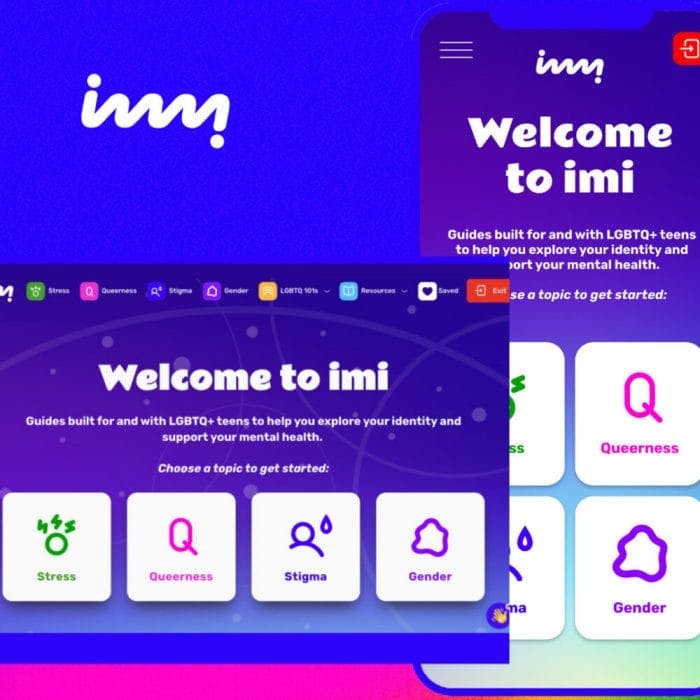imi, A Free, Mental Health Web App, Helps LGBTQ+ Youth Cope with Stress
Initial data results, detailed in a preprint manuscript, currently under peer review, to be shared by Hopelab at the 2022 Association for Psychological Science (APS) Convention, May 27, 2022
San Francisco, May 27, 2022 — Hopelab today will reveal promising study results about the efficacy of imi, a free, research-backed, mental health web app developed by the innovation lab, in partnership with CenterLink, It Gets Better Project, and hundreds of LGBTQ+ youth. Initial results from a randomized controlled trial, conducted by researchers at Hopelab and University of Pennsylvania’s Program on Sexuality, Technology, and Action Research (PSTAR), show that imi boosts positive coping skills and mindsets that are important for supporting the mental health of LGBTQ+ youth. The initial results will be shared by Hopelab Research Lead, Emma Bruehlman-Senecal, Ph.D., in a flash talk on May 27, 2022 at the Annual Association for Psychological Science (APS) Convention.
imi, (pronounced eye-me) helps LGBTQ+ youth explore and affirm their identity and learn practical approaches to cope with sexual and gender minority stress in ways that are supportive, relevant, inclusive, and joyful. The web app provides affirming resources, activities, and stories of lived experiences from LGBTQ+ youth on important topics like stress, LGBTQ+ identity, internalized stigma, and gender identity and expression.
Data from the randomized controlled trial (RCT) indicates that imi is effective in supporting the well-being of LGBTQ+ youth. A diverse group of LGBTQ+ youth randomly assigned to receive imi reported significantly greater improvements in coping skills, and significantly greater confidence in their coping abilities than youth randomly assigned to receive a web-based list of freely available, vetted resources for LGBTQ+ youth. These results suggest that imi may play an important role in helping LGBTQ+ teens cope with sexual and gender minority stress.
“Investing in interventions that improve the resilience of sexual and gender minority youth is critical to their survival,” said Dr. José Bauermeister, lead researcher on the RCT. “Due to the stress arising from stigma and discrimination, LGBTQ+ youth are more than twice as likely to report feeling sad and hopeless, and more than three times as likely to have contemplated suicide than their straight and cisgender peers. And these problems are further compounded for youth who face multiple sources of discrimination due to their race, ethnicity, or gender including bias, discrimination, and increased hate speech. We need to help LGBTQ+ young people – especially BIPOC youth – affirm their identities and manage stress using research-backed tools that they can freely access online, where they’re already seeking support.”
While imi is not a crisis tool, nor is it designed to help teens cope with suicidal thoughts, early data suggests that the interventions delivered through imi can boost positive coping skills and mindsets, which are critical supports for LGBTQ+ mental health over the long run.
imi is available for free, starting June 1, 2022 at imi.guide.
To learn more about the new data, detailed in a preprint manuscript (currently under peer review), published in May, please contact hi@hopelab.org with “imi RCT” in the subject line.
Join Dr. Bruehlman-Senecal at the APS symposium to learn more:
Symposium Title: Identity Affirming Content and Coping Skills Delivered Via a web app Supports Sexual and Gender Minority Adolescents’ Ability to Cope with Sexual and Gender Minority Stress
Authors: Emma Bruehlman-Senecal and Jana Haritatos, Hopelab Foundation; Seul Ki Choi, Jesse Golinkoff, Jesse Golinkoff, and José Bauermeister, University of Pennsylvania
Date: Friday, May 27, 2022: 1-2 PM, CT
About Hopelab
Hopelab is a social innovation lab and impact investor advancing entrepreneurs, research, digital health, and solutions that support and empower young people, especially those from historically underserved communities. The organization works to remove systemic barriers to youth mental health and emotional well-being through targeted social impact investments, hands-on design and research support for digital innovation, and translational science partnerships. Learn more at hopelab.org.




